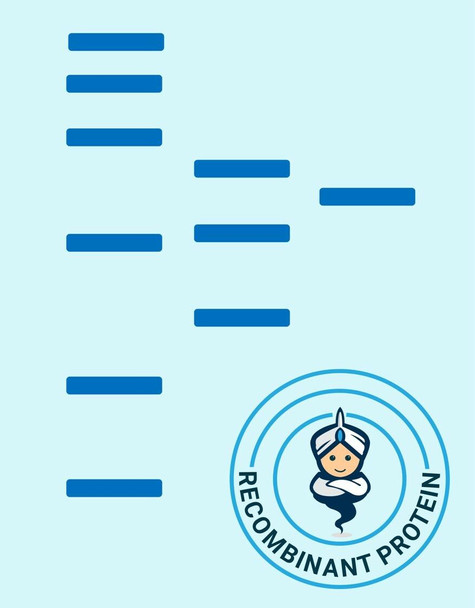Description
| Product Name: | Human NKX3-1 Recombinant Protein |
| Product Code: | RPPB4103 |
| Size: | 20µg |
| Species: | Human |
| Target: | NKX3-1 |
| Synonyms: | Homeobox protein Nkx-3.1, Homeobox protein NK-3 homolog A, NKX3-1, NKX3.1, NKX3A, NKX3, BAPX2. |
| Source: | Escherichia Coli |
| Physical Appearance: | Sterile Filtered colorless solution. |
| Formulation: | NKX3-1 protein solution (0.5mg/ml) containing 20mM Tris-HCl buffer (pH 8.0), 2M UREA and 10% glycerol. |
| Stability: | Store at 4°C if entire vial will be used within 2-4 weeks. Store, frozen at -20°C for longer periods of time. For long term storage it is recommended to add a carrier protein (0.1% HSA or BSA).Avoid multiple freeze-thaw cycles. |
| Purity: | Greater than 85.0% as determined by SDS-PAGE. |
| Amino Acid Sequence: | MGSSHHHHHH SSGLVPRGSH MGSMLRVPEP RPGEAKAEGA APPTPSKPLT SFLIQDILRD GAQRQGGRTS SQRQRDPEPE PEPEPEGGRS RAGAQNDQLS TGPRAAPEEA ETLAETEPER HLGSYLLDSE NTSGALPRLP QTPKQPQKRS RAAFSHTQVI ELERKFSHQK YLSAPERAHL AKNLKLTETQ VKIWFQNRRY KTKRKQLSSE LGDLEKHSSL PALKEEAFSR ASLVSVYNSY PYYPYLYCVG SWSPAFW |
NK3 Homeobox1 (NKX3-1) is a homeobox-containing transcription factor, which binds preferentially the consensus sequence 5'-TAAGT[AG]-3' and may act as a transcriptional repressor. The NKX3-1 transcription factor functions as a negative regulator of epithelial cell growth in prostate tissue. NKX3-1 has an imperative role in normal prostate development, regulating proliferation of glandular epithelium and in the formation of ducts in prostate. In addition, NKX3-1 functions as a tumor suppressor controlling prostate carcinogenesis, as shown by its ability to inhibit proliferation and invasion activities of PC-3 prostate cancer cells. Abnormal expression of NKX3-1 is linked with prostate tumor progression.
NKX3-1 Human Recombinant produced in E.Coli is a single, non-glycosylated polypeptide chain containing 257 amino acids (1-234 a.a) and having a molecular mass of 28.7kDa.NKX3-1 is fused to a 23 amino acid His-tag at N-terminus & purified by proprietary chromatographic techniques.
| UniProt Protein Function: | NKX3-1: Transcription factor, which binds preferentially the consensus sequence 5'-TAAGT[AG]-3' and can behave as a transcriptional repressor. Play an important role in normal prostate development, regulating proliferation of glandular epithelium and in the formation of ducts in prostate. Act as a tumor suppressor controlling prostate carcinogenesis, as shown by the ability to inhibit proliferation and invasion activities of PC-3 prostate cancer cells. Interacts with serum response factor (SRF). Interacts with SPDEF. Interacts with WDR77. Interacts with TOPORS which polyubiquitinates NKX3-1 and induces its proteasomal degradation. By androgens and, in the LNCAP cell line, by estrogens. Androgenic control may be lost in prostate cancer cells during tumor progression from an androgen-dependent to an androgen- independent phase. Highly expressed in the prostate and, at a lower level, in the testis. Belongs to the NK-3 homeobox family. 5 isoforms of the human protein are produced by alternative splicing.Protein type: Tumor suppressor; Transcription factor; DNA-bindingChromosomal Location of Human Ortholog: 8p21.2Cellular Component: intracellular; nucleusMolecular Function: androgen receptor activity; caspase activator activity; estrogen receptor activity; estrogen receptor binding; histone deacetylase binding; protein binding; protein kinase activator activity; protein self-association; sequence-specific DNA binding; transcription factor activity; transcription factor bindingBiological Process: androgen receptor signaling pathway; branching morphogenesis of a tube; caspase activation; multicellular organismal development; negative regulation of cell proliferation; negative regulation of epithelial cell proliferation; negative regulation of insulin-like growth factor receptor signaling pathway; negative regulation of mitotic cell cycle; negative regulation of transcription, DNA-dependent; positive regulation of caspase activity; positive regulation of cell division; positive regulation of cell proliferation; positive regulation of mitotic cell cycle; positive regulation of phosphoinositide 3-kinase cascade; positive regulation of protein amino acid phosphorylation; positive regulation of transcription from RNA polymerase II promoter; positive regulation of transcription, DNA-dependent; protein kinase B signaling cascade; response to testosterone stimulus; salivary gland development |
| UniProt Protein Details: | |
| NCBI Summary: | This gene encodes a homeobox-containing transcription factor. This transcription factor functions as a negative regulator of epithelial cell growth in prostate tissue. Aberrant expression of this gene is associated with prostate tumor progression. Alternate splicing results in multiple transcript variants of this gene. [provided by RefSeq, Jan 2012] |
| UniProt Code: | Q99801 |
| NCBI GenInfo Identifier: | 17377578 |
| NCBI Gene ID: | 4824 |
| NCBI Accession: | Q99801.2 |
| UniProt Secondary Accession: | Q99801,O15465, Q9H2P4, Q9H2P5, Q9H2P6, Q9H2P7, Q9HBG0 |
| UniProt Related Accession: | Q99801 |
| Molecular Weight: | 21,626 Da |
| NCBI Full Name: | Homeobox protein Nkx-3.1 |
| NCBI Synonym Full Names: | NK3 homeobox 1 |
| NCBI Official Symbol: | NKX3-1�� |
| NCBI Official Synonym Symbols: | NKX3; BAPX2; NKX3A; NKX3.1�� |
| NCBI Protein Information: | homeobox protein Nkx-3.1 |
| UniProt Protein Name: | Homeobox protein Nkx-3.1 |
| UniProt Synonym Protein Names: | Homeobox protein NK-3 homolog A |
| Protein Family: | Homeobox protein |
| UniProt Gene Name: | NKX3-1�� |
| UniProt Entry Name: | NKX31_HUMAN |










